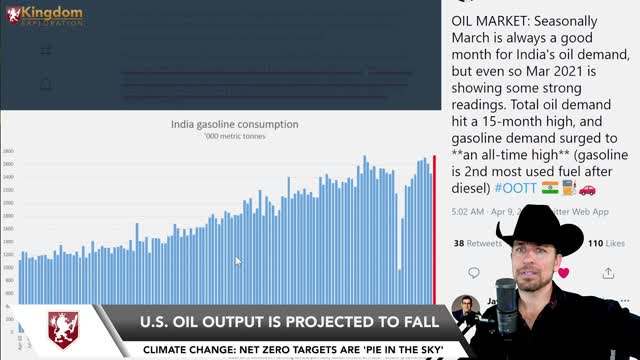Premium Only Content

Oil Prices - While OPEC ramps up production, U.S. oil output is projected to fall
U.S. oil output is set to reach 11.04 million barrels day this year, down from last month’s forecast at 11.15 million after a deep freeze in February that shutdown the oil industry in Texas, according to U.S. government data. The Energy Information Administration also lowered its output forecast for 2022 by 100,000 barrels a day.
Call Kingdom Exploration to discuss our current oil investment drilling project. (307) 622-1645
Subscribe to my channel : https://www.youtube.com/c/kingdomexplorationllc?sub_confirmation=1
Request Information : http://kingdomexploration.com/Request-Oil-Investment-Brochure
The lower output forecast comes as Wall Street has grown reluctant to fund growth while shale operators are focused on increasing cash flow and return to investors rather than adding production. With the U.S. unlikely to return to previous output levels, OPEC+ is moving to roll back part of their supply cuts in the coming months.
“It would be very hard for the US oil and gas industry to get back to over 13 million barrels a day. I don’t think that’s going to happen,” Occidental Petroleum Corp. Chief Executive Officer Vicki Hollub said at a conference Tuesday. “Too much investment would be required,” she said, reiterating her view that U.S. has past peak oil production.
The OPEC+ decision expressed growing confidence in the economic recovery and higher oil prices. In the past four months, benchmark U.S. crude oil prices have gained over 36%.
Even though the EIA is lowered its forecast, production will likely expand modestly from current levels. American explorers are still moving to add supply, last week they to add the most rigs in more than a year. Still, the oil rig count stands at about half of what it was when the pandemic began.
With the U.S. unlikely to return supply to pre-pandemic levels, some market observers don’t expect global crude supplies to grow fast enough to satisfy demand as vaccinations proliferate and economies reopen.
Oil supply is proving to be “mostly inelastic” in the very near-term, as shown by the lack of production growth after Saudi Arabia’s cut prices rallied this year, Jeff Currie, head of commodities research at Goldman Sachs Group Inc., said in a Bloomberg Television interview last week.
OPEC Is Betting Big On Robust Oil Demand Recovery
Most analysts continue to believe that the market will be able to absorb the new barrels from OPEC+ with strengthening demand going into the summer months. Goldman Sachs, for example, is still bullish on oil and anticipates strong demand that would require OPEC+ putting another 2 million bpd on the market in the third quarter, after the around 2 million bpd that the alliance and Saudi Arabia decided to return between May and July.
Climate change: Net zero targets are 'pie in the sky'
India lambasted the richer world's carbon cutting plans, calling long term net zero targets, "pie in the sky."
India, the world's fourth largest emitter, doesn't seem keen to join the club.
"2060 sounds good, but it is just that, it sounds good," Raj Kumar Singh, India's minister for power, told a meeting organised by the International Energy Agency (IEA).
"I would call it, and I'm sorry to say this, but it is just a pie in the sky."
Their energy minister said poor nations want to continue using fossil fuels and the rich countries "can't stop it".
Saudi Arabia’s scramble for an exit strategy in Yemen
The Saudi Arabia-led alliance’s military intervention in Yemen has not only failed in its objective to rout the Houthi rebels, but the kingdom finds itself in a position in which it might be forced to capitulate.
“The Houthis have proven to be a formidable fighting force. Saudi Arabia does not have a comparable ground game that can match their adversaries’,” Nader Hashemi, director of the Center for Middle East Studies at the University of Denver, told Al Jazeera.
This reality is far from what Saudi Arabia had initially anticipated when it entered into the war via Operation Decisive Storm in March 2015.
“Saudi Arabia thought it would win this war via a bombing campaign, and it would all be over in a few weeks. We have now entered the seventh year of this war with no clear end in sight,” Hashemi said.
-
 0:21
0:21
KTNV
4 years agoOPEC strikes a deal over oil production
24 -
 3:27
3:27
Donald Trump Jr.
3 years agoBuckle Up! Oil Prices Are Already Soaring with Biden
63.2K426 -
 0:45
0:45
STLNutritionDoc
3 years agoInput Output
27 -
 1:55
1:55
KGUN
3 years agoSoaring gas prices
3.36K7 -
 13:16
13:16
kingdomexplora
3 years ago $0.01 earnedOIL SUPPLY CRUNCH COMING! - Oil Prices January
136 -
 0:46
0:46
Just the News
4 years agoOPEC and Allies Reach Deal to Cut Oil Production
13.1K -
 1:44
1:44
WCPO
3 years agoSoaring Used Car Prices
45 -
 0:32
0:32
KMGH
3 years agoMarch Housing Sales: Prices up again
291 -
 2:55
2:55
Corey Chambers
3 years agoDTLA Home Prices Fall Property Values Plummet in 2020
44 -
 2:46:06
2:46:06
DDayCobra
14 hours ago $21.17 earnedCobraCast 199
89.4K19